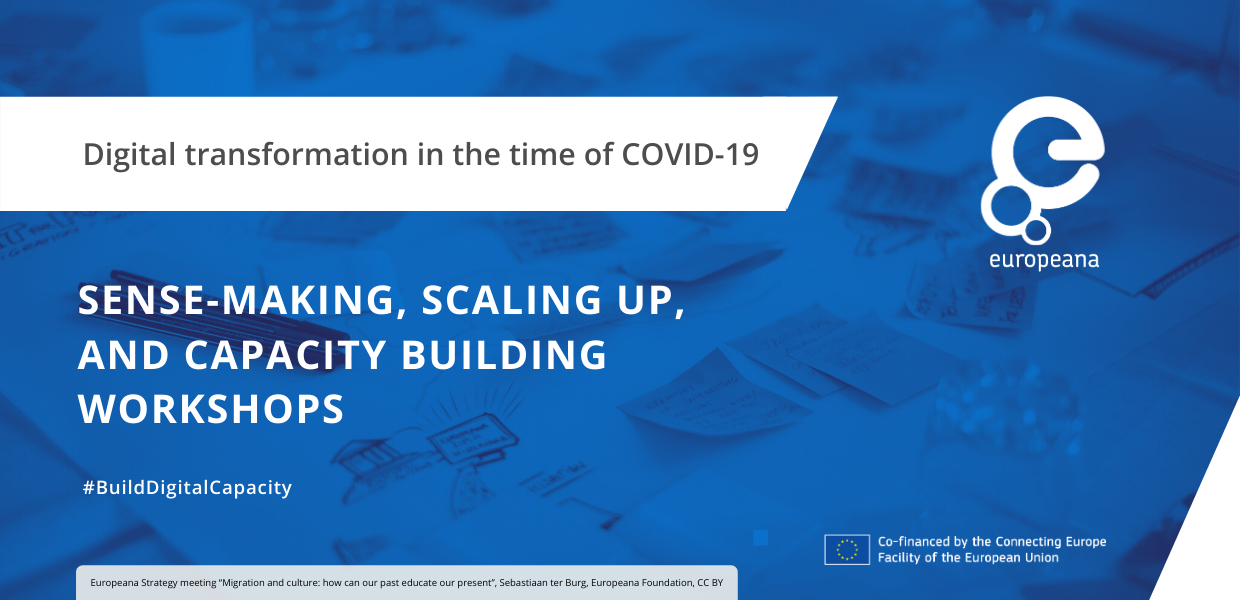Digital transformation in the time of COVID-19: collaboration for hard questions
Throughout June, Europeana has brought together 60 cultural heritage professionals from across Europe for a special series of peer-to-peer workshops on ‘Digital transformation in the time of COVID-19’. In this post, one of the process’s facilitators, Jasper Visser, discusses the final workshops which took place in the series and two themes that stood out: asking ‘hard’ questions and the importance of collaboration.

- Title:
- Europeana Strategy meeting “Migration and culture: how can our past educate our present”,
- Creator:
- Sebastiaan Ter Burg
- Institution:
- Europeana Foundation
- Copyright:
- CC BY
Last week, we concluded Europeana’s online sense-making workshops about digital transformation in the time of COVID-19. Over three weeks, participants explored topics including digital cultural heritage, COVID-19 and Black Lives Matter. In the coming weeks, my fellow facilitator Michael Peter Edson and I will work on a report of the outcomes of this process, but this post explores two ideas that stood out to me in last week’s workshops.
Asking hard questions
Early in the week, a participant mentioned that what the process offered, and what they appreciated, was the opportunity to engage with ‘hard questions’. More than once, participants joked that we, the facilitators, had a knack for asking these. For instance, the question of what it would take to make the working practices which have emerged over the past few months sustainable, or what we need as a sector to be successful in the future that is not already present in our networks. Given that the questions and prompts that participants were asked to respond to were updated throughout the process to reflect the conversations, many of these hard questions are actually ones participants asked themselves.
We’ve hinted at some of these questions in earlier posts. They deal with a range of themes. From data security and open access to storytelling and leadership. From inclusion and diversity to collaboration and partnerships. All in all, we’ve discussed around four dozen themes in the workshops.
It is difficult for anyone to have a resolute opinion on all these topics. Especially given, as one participant noted in a line that I will not soon forget, that a real expert knows there are different ways to look at something.
Additionally, others mentioned that GLAMs and cultural heritage professionals are susceptible to the ‘perfection trap.’ We would rather not speak up unless we’re confident we’re right. Which raises the question another participant posed: ‘How do we deal with topics that we are not an expert in?’
In the time of COVID-19, Black Lives Matter, climate change, and other urgent and transformative movements, this question is one of the hardest of all. And its answer may be evident.
Collaboration
Individually, we do not have to be experts in everything. Instead, collectively, we need to have access to all relevant expertise that we need in our current and future roles. This means we need to collaborate with each other, in our organisations, in our field and beyond it. Not surprisingly, throughout the workshops and the surveys, participants mentioned collaboration repeatedly.
On a basic level, COVID-19 changed collaboration within organisations. Some hierarchies were restructured. Digital teams found renewed meaning in organisations where their expertise was in high demand. On a more strategic level, participants mentioned they were inspired by collaborations happening within the sector as a response to the crisis, as well as by partnerships beyond the confines of GLAMs.
Collaboration with each other was highlighted as a way forward for the sector. One participant challenged us to think of the (digital) GLAM sector as, ‘one big company.’ Like a multinational organisation, in this company, we already share infrastructure, resources, knowledge, and experiences and could do this more in the future.
Collaboration, which is always a popular idea in workshops like this, may have renewed relevance in the wake of the COVID-19 crisis, which has shown that within the cultural heritage sector there is solidarity and a willingness to support each other when we can. One participant observed that as cultural professionals, we are all humans and share many things, including problems.
Next steps
In the coming weeks, Michael Peter Edson and I will be writing up a report on these workshops, sharing and detailing the most influential and frequently mentioned themes. Our ambition is not to provide a definitive answer or direction for any of them, but to show the diversity of perspectives that exists. As a collective, it seems, we’re expert enough to know there are always different ways to look at something.
Looking back on the last three months, what hard questions have you asked yourself? What ideas, concepts or words stand out to you as important for the (near) future of our sector? We’d love to hear about them! Please share your thoughts on Twitter with the hashtag #BuildDigitalCapacity. Feel free to tag @Europeanaeu, @mpedson or @jaspervisser as well. Your insights and ideas will help us shape the conversations and outcomes of this process.
Look out for an upcoming Pro news piece where we will share the outcomes of this report. You can also sign up to stay up to date with the project.

